#roman polytheism
Text
To my pagan/polythiest friends, heres a reminder to actually sit and chat with your deity about what you want/need and what would make life easier for you. They cant read minds most of the time (when you're not actively quietly communicating with them) and communication can only strengthen bonds. Go say that thing youre terrified to say or admit that you dont like some aspect of your practice. 90% of the time life gets easier when you do. And they're genuinely happy to see you succeed how you want to.
I see u, you're doin great
-Grey ♡
#awitchesworship#practicing pagan#pagan witch#paganism#paganblr#hellenic polytheism#norse polytheism#roman polytheism#polytheist#polytheism
342 notes
·
View notes
Photo
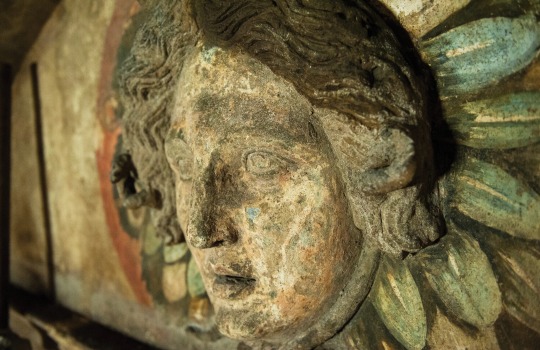
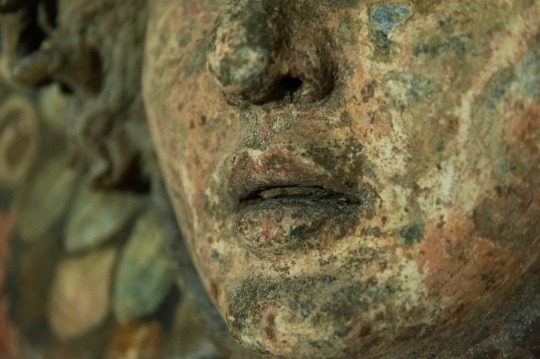
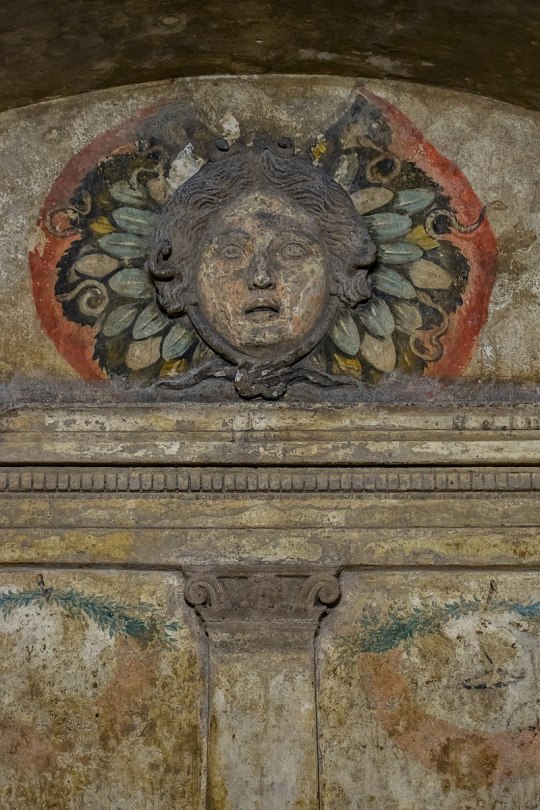
Medusa from Ipogeo dei Cristalli, naples, IT
4K notes
·
View notes
Text
DEITY IDENTIFICATION SPREAD by Jagoda

Card 1: a card that represents the deity.
Card 2: a positive trait of that deity
Card 3: a negative trait of that deity (darker, bad, ""evil"" , or just a trait that is seemingly negative by humans)
Card 4: domain, what the deity rules over
Card 5: minor domain, what a deity rules over but isn't talked a lot about
Card 6: that deity's mythology
Card 7: what a deity is associated with
Card 8: what the deity wants to work on with you
#witchcraft#pagan#paganism#deity work#mythology#spirituality#witch#witches of tumblr#witchblr#demonolatry#hellenic polytheism#hellenic pagan#roman polytheism#deity worship#deity identification#tarot#divination#tarot spread#tarot reading
224 notes
·
View notes
Text
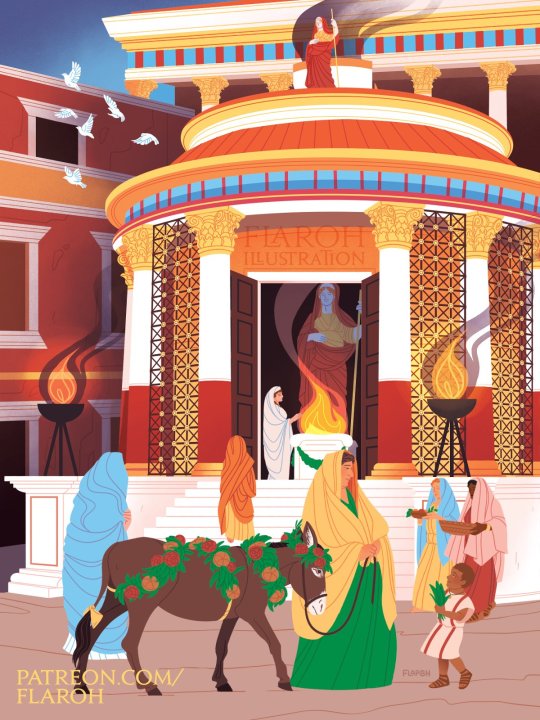
Io Vestalia everyone!🔥🌿🫓
Heres my illustration of the temple to Vesta in the Roman Forum with worshippers 🏛️ i just love how colourful ancient Rome was!
During the Vestalia celebrations women could enter the Temple of Vesta (barefoot) to leave her offerings. Donkeys, sacred to the goddess, were also decorated with flowers and mini loaves of bread (so cute!). Overall the goddess was celebrated to ensure Rome's own prosperity.
I've chosen to depict the Severan reconstruction of the temple, built under Julia Domna after a devastating fire. This new build was significantly different from it's predecessor, which was supposedly destroyed completely in the fire. While Ovid (100 years before) stated that the temple had /no/ statue inside, I've seen that Domna's coins depicting her new temple show a figure of Vesta inside. While this could be an allegorical image, the figure is seated, which makes me believe it depicts an actual statue.
781 notes
·
View notes
Text
What Non-Pagans Need to Know About Fiction Featuring Pagan Gods

In light of Marvel's Loki show dropping a second season and a new Percy Jackson series on the horizon, I want to say some things about how fandom spaces can be respectful of real-life pagan religion.
Let's get one thing out of the way: literally no one is saying you can't enjoy fiction that uses pagan gods and heroes as characters. No one is saying, "Stop writing stories about our gods." In fact, many ancient cultures wrote fiction about their gods -- look at Greek theater or the Norse Eddas. The act of writing fiction about the gods is not offensive in itself.
But please remember that this is someone's religion.
The gods are not "just archetypes." Their myths are not "just stories." Their personalities are not a matter of artistic interpretation. For many pagans, the gods are very much real in a literal sense. I don't think Thor is a metaphor or a symbol -- for me, Thor is a real, autonomous spiritual being who exists outside of human perceptions of him, and who I have chosen to build a relationship with. Even if you are a hardcore atheist, I would hope you could at least be respectful of the fact that, to many modern pagans, the gods are both very real and very important.
When authors are not respectful of this fact, they reduce the gods, these very real objects of worship, to fictional characters. And here's the thing about fictional characters: they are fundamentally tools for authors to use to draw a desired emotional response from an audience.
Dracula's personality and behavior is wildly different depending on who is writing him, because different authors use Dracula to create different reactions in their audiences. In the 1931 film starring Bela Lugosi, he's equal parts alluring and disturbing, a symbol of America's mixed desire and disdain for foreigners. In Nosferatu, he's more strictly frightening and disgusting. In Francis Ford Coppola's movie, he's a tragic, romantic figure clinging to the last scraps of his humanity. In Netflix's Castlevania, he's an incredibly powerful being who has grown bitter and apathetic in his immortality. All of this is Dracula, and all of it is fine, because Dracula is not and never has been a central figure in anyone's religion.
Let's take a look at what happens when authors give this same treatment to real gods:
In Hellenic polytheism, Apollo is one of the most beloved gods, both historically and today. Apollo loves humanity, and humanity loves him back. He is the god of sunlight and of medicine, but also of poetry and song. He is one of humanity's most consistent defenders when one of the other gods gets wrathful. And while he does have dangerous or wrathful aspects of his own (he's also the god of disease, after all), he's also kind and soft with humanity in a way other gods often aren't, at least in some historic sources.
In the Lore Olympus comic series, Apollo is a villain. He's characterized as an abuser, a manipulator, and a violent man child. LO!Apollo is downright hateful, because the author wants us to hate him. Lore Olympus is a retelling of a myth about an abduction and forced marriage. Lore Olympus is also a romance. In order to get the audience to sympathize with Hades and root for his relationship with Persephone, Rachel Smythe needed to make someone else the villain. Apollo is the most obvious and extreme character assassination in Smythe's work, but several other gods (notably Demeter) also get the asshole makeover to tell the story Smythe wants to tell.
Here's where this becomes a problem: Hellenic polytheism is a fairly small religious community, while Lore Olympus is a massively popular webtoon with 1.3 billion views as of August 2023, print books available from major retailers, a TV adaptation in the works, and a very active online fandom. Rachel Smythe currently has a MUCH bigger platform than any Hellenic polytheism practitioner. Smythe and other authors are shaping how modern culture views the Hellenic gods, and that has a very real impact on their worshipers.
This means "Apollo is an abusive asshole" is becoming a popular take online, and is even creeping into pagan communities. I've personally seen people be harassed for worshiping Apollo because of it. I've seen new pagans and pagan-curious folks who totally misunderstand the roles Apollo, Hades, and Persephone play in the Hellenic pantheon because of Lore Olympus and other modern works of fiction.
There are tons of other examples of this in modern pop culture, but I'll just rattle off a few of the ones that annoy me most: Rick Riordan depicting Ares/Mars as a brutish asshole hyped up on toxic masculinity; Rick Riordan depicting Athena as a mother goddess; Marvel depicting Thor as a dumb jock; Marvel depicting Odin as a cold, uncaring father; DC depicting Ares as purely evil; whatever the fuck the Vikings TV show was trying to do with seidr; the list goes on.
All of these are examples of religious appropriation. Religious appropriation is when sacred symbols are taken out of their original religious context by outsiders, so that the original meaning is lost or changed. It requires a power imbalance -- the person taking the symbols is usually part of a dominant religious culture. In many cases, the person doing the appropriation has a much bigger platform than anyone who has the knowledge to correct them.
When Rick Rioridan or Rachel Smythe totally mischaracterizes a Greek god to tell a story, and then actual Hellenic pagans get harassed for worshiping that god, that's religious appropriation.
Religious appropriation is a real issue. This isn't just pagans being sensitive. To use an extreme example: Richard Wagner and other German Romantic authors in the 19th century used the Norse gods and other Germanic deities as symbols in their work, which was a major influence on Nazi philosophy. Without Wagner, the Nazis would not have latched onto the Norse gods as symbols of their white supremacist agenda. To this day, there are white supremacist groups who claim to worship our gods or who use our religious imagery in their hate movement. We are still reckoning with the misinterpretation of our gods popularized by Wagner and other German Romantics almost 200 years ago.
Again, no one is saying you can't enjoy fiction based on pagan mythology. But there are a few things you can do to help prevent religious appropriation in fandom spaces:
Above all else, be mindful that while this may just be a story to you, it is someone's religion.
Recognize that enjoying fiction based on our gods does not mean you know our gods. You know fictional characters with the same names as our gods, who may or may not be accurate to real-life worship.
Do not argue with or try to correct pagans when we talk about our experience of our gods.
Don't invalidate or belittle pagan worship. Again, this mostly comes down to recognizing that our religion is totally separate from your fandom. We aren't LARPing or playing pretend. Our sacred traditions are real and valid.
If you see other people in your fandom engaging in religious appropriation, point out what they are doing and why it isn't okay.
Please tag your fandom content appropriately on social media. Always tag the show, movie, book, etc. that a post is about in addition to other relevant tags. This allows pagans to block these fandom tags if we don't want to see them and prevents fandom content showing up in religious tags.
For example, if I'm posting about Athena from the Percy Jackson books, I would tag the post #athena #athenapjo #percyjackson #pjo. You get the idea.
And if fiction sparks your interest and you want to learn more about the actual worship of the gods, you can always ask! Most pagans love talking about our gods and trading book recs.
If you are writing fiction based on real mythology, talk to people who worship those gods. Ask them what a respectful portrayal would look like. If possible, include a note in your finished work reminding audiences that it is a work of fiction and not meant to accurately portray these gods.
#btw hades is also not a villain in helpol#this post is just mostly discussing how lo villiainizes apollo#shoutout to my roman pagan husband for proofreading and offering feedback#this post is Approved By The Council#psa#long post#paganism#pagan#paganblr#heathenry#norse heathen#norse paganism#inclusive heathenry#hellenic polytheism#helpol#religio romana#roman polytheism#roman pagan#marvel#mcu#loki series#loki season 2#percy jackson#percy jackson and the olympians#pjo#lore olympus#religious appropriation#my writing#white supremacy mention#white supremacy tw
306 notes
·
View notes
Text
I'm interested to see how the people here prefer to spend time with the Gods :) I tried to be general, but feel free to add your specific favorite activity if you share !
#helpol#hellenic polytheism#polytheism#roman polytheism#kemetic polytheism#hinduism#paganism#religion#devotional acts#polls#theoi#norse paganism#norse polytheism#praxis#paganblr
187 notes
·
View notes
Text
Please reblog for a bigger sample size! 🧡
151 notes
·
View notes
Text
My Drive Resource Libraries
Feel free to download, share, etc. I found most everything through open access journals, JSTOR, Anna's Archive, sci-hub, pdfs shared on other sns, etc.
Greek Polytheism & Hellenism
Roman & Italic Polytheism
Gaulish & Gallo-Roman Polytheism
Celtiberian Polytheism
#hellenism#helpol#cultus deorum#greek polytheism#polytheism#roman polytheism#gaulpol#gaulish polytheism#gaulish pagan#celtiberian
430 notes
·
View notes
Text
Paganism poll!
If you call your believes "a pagan religion", please vote down below! I'm making a little research for myself, results of which I will post on this blog.
I've made a similar Greek polytheism post!
To clarify, we're are not choosing just one option here! It is implied that nature worship is within the religion or practice regardless. It is the question of mindset of what you put first in your day-to-day worship, what do your festivals/holidays revolve around and such.
If you answer on the poll, please comment/tag your answer and the religion you follow/attribute yourself to!
Although it is not necessarily required for the research I'm doing, that will allow me to do more specific attributions of what religions do people call pagan and what's their actual central part of worship!
Huge thanks to anyone who votes!
Please reblog for a bigger sample size!
#hellenic polytheism#hellenic paganism#norse paganism#norse polytheism#slavic paganism#kemetic paganism#kemeticism#kemetic polytheism#roman polytheism#roman pagan#celtic paganism#helpol#hellenic pagan#hellenic polythiest#morsel:orig#morsel:helpol
132 notes
·
View notes
Text
Dionysus appears to people in a vast number of ways. His appearance changes depending on who He appears to and where.
This is something that is historically true: we see very different depictions of Him in writing, sculptures, mosaics, ceramics, and other mediums of Ancient art. In those pieces of art He takes a large number of forms: young and old, bearded and beardless, fat and slim, without visible muscle and with prominent musculature, tall and short, naked and dressed, with and without an ivy wreath, with soft features and with sharp features, long-haired and short-haired, and so on and so forth.
In writing, He is referred to as androgynous and spoken of as possessing multiple feminine qualities, be it of looks or character. Euripides has Him referred to as "girl-faced" (The Bacchae, lines 400-799) while inscriptions from Beroea dated 248-264 AD give Him the title Ψευδάνωρ ("effeminate man", lit. "false man"). Some researchers add that He is the only Deity whose domain doesn't correlate with His gender in the Greek language: the only word related to Dionysus that is masculine in grammar is ο κισσός, which means "ivy"; all of the other words related to Him are feminine.
I will attach some of His depictions to show just how Diverse Ancient perception of Him was. Dionysus is a God that is constantly changing His appearance, which is why whatever way He chooses to present Himself to you is valid.
Regardless of what gender presentation, body type, facial features, height, weight, or skin color you see Him as; none of these are wrong because He's choosing to appear to you a personal way.
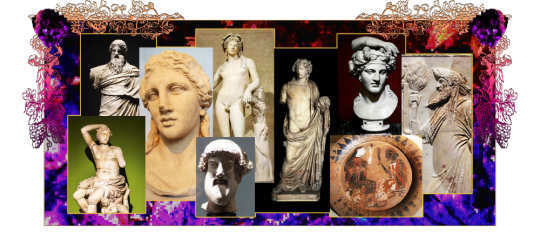
#𓆩☠︎𓆪 ˣ 𝐒𝖙𝖞𝖌𝖎𝖆𝖓#theoi#greek gods#roman gods#hellenism#helpol#hellenic polytheism#hellenic paganism#roman polytheism#dionysus deity#dionysus worship#dionysus
927 notes
·
View notes
Text
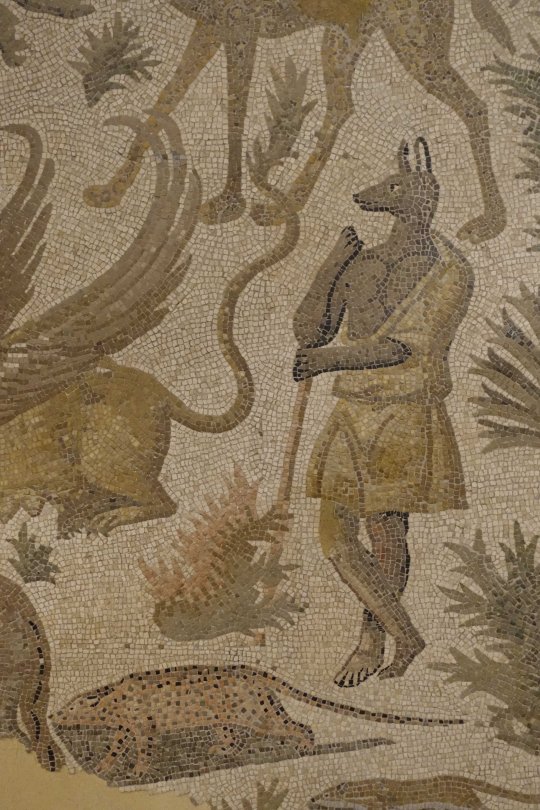
Anubis or Hermanubis.
Museo della Città, Rimini, Italy.
#yinepu#kemetism outside egypt#kemetism#kemeticism#roman polytheism#cultus deorum#paganism#neopaganism
1K notes
·
View notes
Photo

A maenad and a satyr, roman art
1K notes
·
View notes
Text
Just a smãaaaaaalll reminder that Roman deities aren't copy paste Greek deities!!
If you look deeper into Roman history, you can see that most of these "Roman Equivalent of greek gods" are actually from other people of the Italian peninsula! Such as Sabines, Etruscans, Samnites, and more!
Sorry guys but i might have a hyper fixation on roman polytheism and... Lady Minerva's kindness is noooot helping it /pos love her!!!
#witchcraft#paganism#pagan#deity work#mythology#witch#spirituality#deity worship#roman paganism#roman polytheism#minerva
182 notes
·
View notes
Text
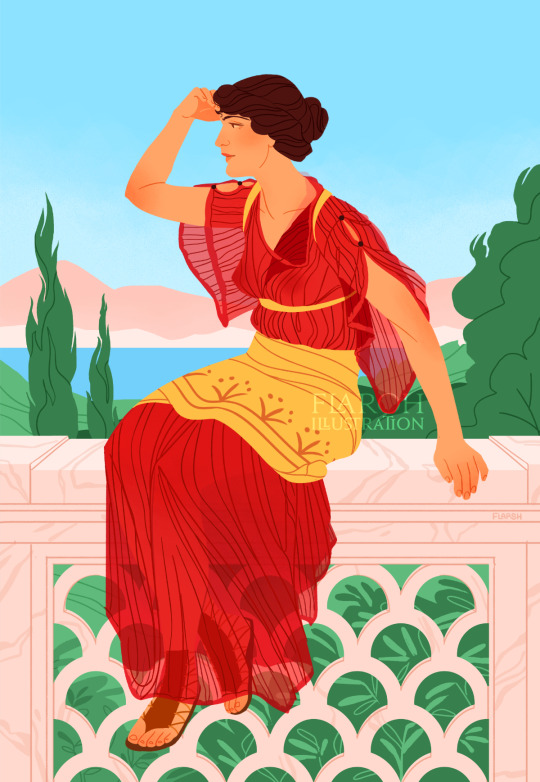


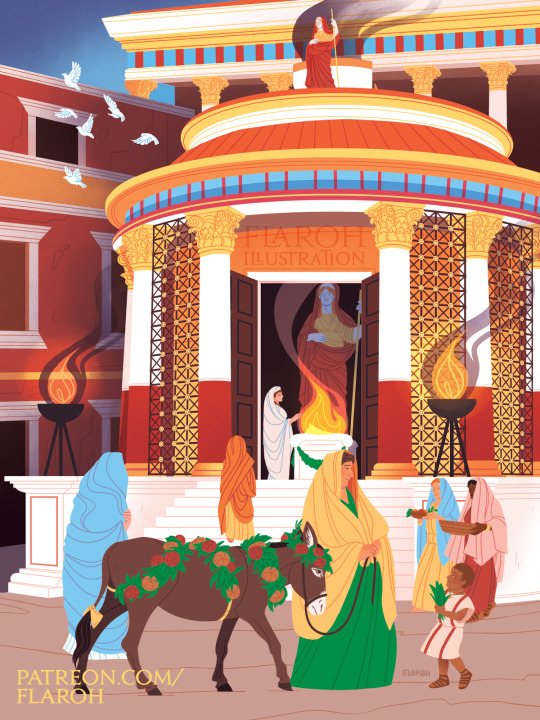

Celebrating ancient women today on the Bona Dea 🥰🌿
On May 1st, Roman women venerated the goddess Bona Dea (the Good Goddess)! Men were not allowed at these rites, so much of the details, including the goddess' real name, are lost to history…
888 notes
·
View notes
Text
Roman polytheism is so very fascinating to me. It's unfortunately misunderstood by a lot of people as some kind of "rip-off" of Greek polytheism when in fact, it finds its source in so many different influences from all around the Mediterranean. If you are a roman polytheist, you are valid and you have all my respect.
#thought#spirituality#roman polytheism#a message of positivity from a norse pagan to my fellow polytheists#deity work#deities#polytheism#pagan#personal#paganism
197 notes
·
View notes
Text
I love u tumblr pagans I love u polytheists I love u deity devotees I love u all and this niche little community we've created for ourselves
I love that the same love people have been experiencing for their deities for hundreds and hundreds of years moves through us
I love that we are all part of the gods and they are part of us and we are all part of each other
I love all of you and how we love
Love love love u ❤️
#hellenic pantheon#hellenic polytheism#hellenic gods#hellenic polytheist#hellenic pagan#hellenic paganism#helpol#hellenic polytheist community#norse paganism#celtic paganism#norse polytheism#celtic polytheism#polytheism#roman polytheism#paganism#paganblr#witchbr#deity worship#deity witchcraft#deity work#deity devotion
346 notes
·
View notes